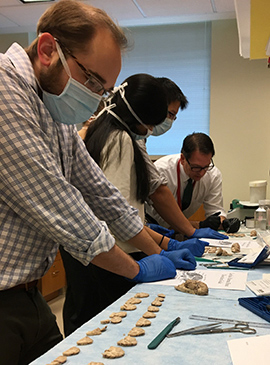Didactic Sessions - Neurology Residency

Dr. Peter Crino, far right, teaches a neuroanatomy lesson to UMMC’s neurology residents.
Morning Learning — 7:45-8:15 am
Weekdays during the summer: Tuesdays and Thursdays from September-June
A curriculum of case-based clinical learning, patient safety discussions, wellness sessions and more.
Grand Rounds — Wednesdays at 2 pm
Local, national and international speakers are invited to lecture on their areas of expertise, encompassing a variety of current topics in Neurology and allied specialties.
Clinical Case Conference — Wednesdays at 3 pm
A resident or fellow presents an interesting patient for discussion. Whenever possible, the presenting resident will discuss a case that is linked to the grand rounds' topic.
Midday Conference — Weekdays 11:30 am-12:30 pm. Lunch provided.
The midday didactics are daily sessions that are designed to augment the residents' knowledge base by incorporating various teaching styles and approaches to optimize integration of long-term knowledge to prepare residents for their clinical careers as well as the in-service and board certification examinations.
The midday conference sessions for the year begin with a series on neurologic emergencies utilizing the Emergency Neurology Life Support (ENLS) curriculum as well as sessions covering high-frequency situations likely to be encountered on call. There is then a series of sessions on neurologic frameworks in which a few sessions are devoted to each of the major neurology topics to provide an overview of the breadth of neurologic diseases and diagnostic testing that residents should be familiar with. The rest of the year is then organized into blocks of sessions by disease category. The general design of each block is similar, although the length of the blocks varies.
The beginning lectures focus on anatomy, physiology and embryology to serve as a platform for the latter topics. The latter topics focus on the pathophysiology, diagnostic approach and therapeutic interventions for specific groups of disease states (e.g. acquired neuropathies or genetic stroke syndromes). Many of the sessions are designed to be interactive, which helps solidify the learners' knowledge.
The one unique aspect of our didactic series is that this is protected time for our residents. Nursing holds all non-urgent communication during this time. The attendings, fellows and advance practice providers will answer any urgent calls. This ensures that our residents have the opportunity to learn neurology in the classroom setting to supplement the vast amount of knowledge that they are gaining with their clinical experiences. Overall, the residency training program is dedicated to providing the best educational opportunity for residents through clinical experience, reading and classroom learning sessions.
Specific sessions integrated into the midday conference schedule:
Morbidity and Mortality Conference — Monthly
The senior residents recently on service will present information for discussion on patient outcomes from the preceding month and select individual cases with adverse outcomes or areas for improvement. The sessions focus on a no-fault root cause analysis with an emphasis on action plans or investigations for quality improvement.
Resident Meeting — Monthly
The Program Director and Associate Program Directors meet with the residents to discuss any resident concerns, disseminate information, and brainstorm ideas for improvements. Residents are encouraged to suggest agenda items for discussion and provide ideas on how to improve the residency program or clinical practice.
Chair Rounds — Monthly
Special topic sessions organized by the Chair include:
- How to get involved and organize research projects
- Economics of healthcare
- Career counseling discussion panels
- Interesting clinical case discussions
- Neuroanatomy review with sheep brain dissection
Visiting Grand Rounds Speaker Sessions — Wednesdays
The visiting grand rounds speaker for the week will give an additional session just for the residents to discuss further learning points on their area of expertise and/or discuss aspects of their career that may be educational examples for the residents in thinking about their career options.


